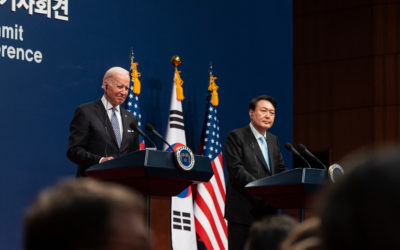On April 26, U.S. President Joe Biden welcomed South Korean President Yoon Suk-yeol to the White House for a summit meeting to celebrate the seventieth anniversary of the U.S.-South Korea alliance and open a new chapter for the next seventy years of expanded cooperation. Amid a substantial list of topics discussed by the two leaders, extended deterrence emerged as the top deliverable.
Is the global decline in democracy linked to social media?
Is the global decline in democracy linked to social media?
Is the global decline in democracy linked to social media?
Here are two common ways of thinking about democracy in the online era. First, the internet is a liberation technology and will usher in an era of global democracy. Second, you can have social media or democracy, but not both.
Which is more correct? There is no doubt democracy is in retreat around the globe. Even supposedly stable democracies have recently seen events incompatible with democracy and the rule of law, such as the violent assault on the US Capitol in 2021.
To understand the role of social media in this process, we carried out a systematic review of the evidence linking social media to ten indicators of democratic wellbeing: political participation, knowledge, trust, news exposure, political expression, hate, polarisation, populism, network structure, and misinformation.
We reviewed almost 500 studies across different platforms in countries around the globe, and saw some broad patterns emerge. Social media use is linked to an increase in political engagement, but also increases in polarisation, populism, and distrust in institutions.
Different kinds of evidence
In our review, we put greater weight on research establishing causal links between social media and indicators of democratic wellbeing, rather than just correlations.
Correlations can be interesting, but they cannot prove any outcome is caused by social media use. For example, suppose we find a link between social media use and hate speech. It might arise because people who produce hate speech use social media more, rather than because using social media triggers hate speech.
Causal links can be established in a number of ways, for example through large-scale field experiments. Participants may be asked to reduce Facebook usage to 20 minutes per day or turn off Facebook altogether for a month. (Both interventions led to an increase in wellbeing, and abstaining from Facebook altogether also significantly reduced political polarisation.)
More engagement, more polarisation
Across the 496 articles we considered, most correlational rather than causal, we found a mix of positive and negative effects. As often happens in science, the pattern is complicated but can still be interpreted.
On the positive side, we found digital media use relates to higher political engagement and greater diversity of news exposure. For example, a study in Taiwan found information-oriented social media use increased political participation. However, this was only true if the user believed an individual can influence politics through online actions.
On the negative side, we found considerable evidence for effects such as fostering polarisation and populism, and reducing trust in institutions. The effects on trust in institutions and media were particularly pronounced. During the pandemic, digital media use has been shown to be associated with COVID-19 vaccine hesitancy.
Another negative outcome of social media use, in a range of political contexts and on various platforms, appears to be increased political polarisation.
We found increased polarisation was also linked to exposure to opposing viewpoints in one’s social media feeds. In other words, being exposed to the words of political opponents did not bridge the political divide. Rather it seemed to amplify it.
Links to violence
We also found a strong and pervasive association between social media use and populism. More social media use translates into a greater vote share for populist parties.
Studies in Austria, Sweden and Australia have found evidence for an association between increased social media use and online right-wing radicalisation. Studies in Germany and Russia have provided causal evidence that digital media can increase the incidence of ethnic hate crimes.
For example, the German study found local outages of Facebook (due to technical faults or internet interruptions, for example) decreased violence in those locations. The authors of the study estimated that 50% less anti-refugee sentiment on social media would reduce violent incidents by 12.6%.
The distribution of effects around the world was also striking. Positive effects on political participation and information consumption were most pronounced in emerging democracies in South America, Africa and Asia. Negative effects were more evident in established democracies in Europe and the United States.
No simple answers
So, to return to where we began: is the internet a liberation technology? Or are social media incompatible with democracy?
There are no simple yes or no answers. There is, however, evidence that digital media impact political behaviour globally. This evidence warrants concern about the adverse impacts of social media on democracy.
Facebook, Twitter and other social media are not per se incompatible with democracy. Democratic welfare, however, requires that scientists carefully study the social effects of social media. Those effects must be evaluated and regulated by voters and elected policymakers, not a small clique of super-rich individuals.
We have seen small but important steps in this direction. The Digital Services Act of the European Union is one. Another is the proposed Platform Accountability and Transparency Act (PATA) in the US, though its fate is uncertain.
This article was republished from The Conversation under a Creative Commons license to point warfighters and national security professionals to reputable and relevant war studies literature. Read the original article.

Stephan Lewandowsky, Chair of Cognitive Psychology, University of Bristol, and Honorary Professor of Psychology, The University of Western Australia • Lisa Oswald, Doctoral researcher in computational social science, Hertie School • Philipp Lorenz-Spreen, Research Scientist, Center for Adaptive Rationality, Max Planck Institute for Human Development • Ralph Hertwig, Director, Center for Adaptive Rationality, Max Planck Institute for Human Development.
Related Articles
President Marcos Jr. Meets With President Biden—But the U.S. Position in Southeast Asia is Increasingly Shaky
Over a four-day visit to Washington, Philippine President Ferdinand Marcos Jr. has been welcomed to the White House and generally feted across Washington. With President Biden, Marcos Jr. (whose father was forced out of office in part through U.S. pressure, and whose family has little love for the United States) affirmed that the two countries are facing new challenges, and Biden said that “I couldn’t think of a better partner to have than [Marcos Jr.].”
The U.S. is about to blow up a fake warship in the South China Sea—but naval rivalry with Beijing is very real and growing
As part of a joint military exercise with the Philippines, the U.S. Navy is slated to sink a mock warship on April 26, 2023, in the South China Sea.
The live-fire drill is not a response to increased tensions with China over Taiwan, both the U.S. and the Philippines have stressed. But, either way, Beijing isn’t happy – responding by holding its own staged military event involving actual warships and fighter jets deployed around Taiwan, a self-governed island that Beijing claims as its own.



